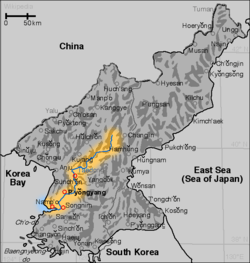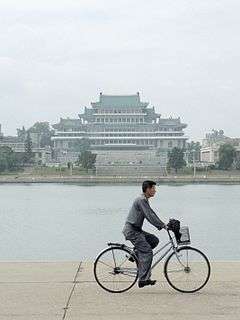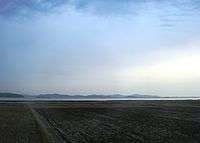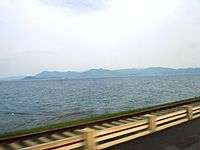Taedong River
The Taedong River (Chosŏn'gŭl: 대동강)[lower-alpha 1] is a large river in North Korea. It rises in the Rangrim Mountains of the country's north. It then flows southwest into Korea Bay at Namp'o.[3] In between, it runs through the country's capital, Pyongyang. Along the river are landmarks such as the Juche Tower and Kim Il-sung Square.
| Taedong River | |
|---|---|
 Map of the Taedong River | |
| Location | |
| Country | North Korea |
| Physical characteristics | |
| Source | |
| • location | Rangrim Mountains, South Hamgyong |
| Mouth | |
• location | West Korea Bay |
| Length | 439 kilometers (273 mi)[1] |
| Basin size | 20,344 km2 (7,855 sq mi) |
| Taedong River | |
| Chosŏn'gŭl | |
|---|---|
| Hancha | |
| Revised Romanization | Daedong-gang |
| McCune–Reischauer | Taedong-gang |
The river is 439 km in length, and generally is deep. It is the fifth-longest river on the Korean peninsula and the second-longest in North Korea. Pyongyang is approximately 110 km upstream from the mouth, Sunchon 192 km upstream, and Taehŭng 414 km upstream. Because of its depth, it is widely used for river transport; it is navigable by large ships up to 65 km inland, although most commercial traffic stops at Songrim.
History
The kingdom of Koguryo was founded on its shores. Many archeological sites dating to the neolithic and Bronze Ages have been found along the river, as well as relics and ruins from Koguryo. It was also once known as the Pae River (패수; 浿水; P’aesu).[4]
Dams and bridges
In 1986, the government completed the 8-km-long West Sea Barrage, with three locks and 36 sluices, at the mouth of the Taedong River near Namp'o.[3] The dam acts to control floodwater and to irrigate lands newly reclaimed from the Korea Gulf.[3] The dam has reduced the river's natural ability to purify itself and tends to concentrate contaminants.[5] Other dams, such as the Nyongwon Power Station, have been built to provide energy to the country.[6]
In Pyongyang, there are six bridges on the Taedong, including the Okryu Bridge, Rungra Bridge, and Taedong Bridge.[7]
Gallery
 Yanggakdo Island in the middle of the river in Pyongyang
Yanggakdo Island in the middle of the river in Pyongyang The Taedong River flowing through Pyongyang
The Taedong River flowing through Pyongyang An image of the Taedong River from 1889
An image of the Taedong River from 1889 The Taedong in Pyongyang
The Taedong in Pyongyang.jpg) Another view of the river through Pyongyang
Another view of the river through Pyongyang The Grand People's Study House on the bank of the river.
The Grand People's Study House on the bank of the river.- The captured USS Pueblo vessel moored on the Taedong (now tied up on the Botong River beside the Victorious Fatherland Liberation War Museum)
 The Taedong River in Nampo
The Taedong River in Nampo The river in Nampo
The river in Nampo
Notes
- In the 19th century, the Taedong was spelled Tai-tang in Western texts (the "Tai-tang River" or "Tai-tang Kang").[2]
References
Citations
- "Encyclopædia Britannica Online : Taedong River". Encyclopædia Britannica.
- EB (1878), p. 390.
- Suh, Dae-Sook (1987) "North Korea in 1986: Strengthening the Soviet Connection" Asian Survey 27(1): pp. 56-63, page 62
- (1973) Transactions of the Korea branch of the Royal Asiatic Society. vol. 48, page 59
- Tenenbaum, David J. (2005) "International Health: North Korean Catastrophe" Environmental Health Perspectives 113(1): p. A26, page A26
- (209) Korea Today No. 640
- "옥류교 [Okryu Bridge]", Doosan Encyclopedia, retrieved 2010-07-02
Bibliography
- , Encyclopædia Britannica, 9th ed., Vol. VI, New York: Charles Scribner's Sons, 1878, pp. 390–394.
See also
| Wikimedia Commons has media related to Taedong River. |
- Taedong River estuary Important Bird Area
- Taedonggang, a beer named after the river
- List of Korea-related topics
- Rivers of Asia
- Rivers of Korea
- Geography of North Korea